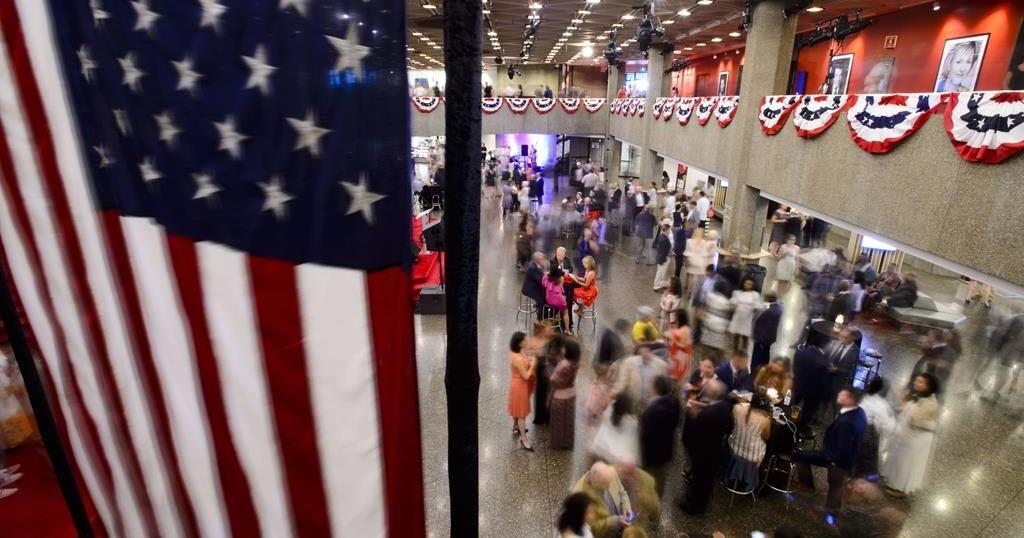OTTAWA – The Canadian government is in a better position to manage trade negotiations with the next American president than it was the last time it signed a deal with the U.S. and Mexico, Foreign Affairs Minister Mélanie Joly said as Americans headed to the polls Tuesday.
U.S. voters are choosing between starkly different visions of their country’s future with either former president Donald Trump or Vice-President Kamala Harris. Whoever wins the White House this year will be in charge when the Canada-U.S.-Mexico trade agreement is reviewed in 2026.
The “Team Canada” approach the Liberal government launched when negotiating with the first Trump administration is already back in play, and Joly said the government is ready to work with premiers, mayors, the business sector and unions to look out for Canadian interests.
Joly also said she’s been speaking with other foreign ministers and world leaders about how to work with the next president.
“So we have an approach that is very broad and we are very unique in the world. We have the strongest and, I think, most important relationship as a country with the U.S.,” Joly said.
While they’ll be watching the election results closely, several cabinet ministers who are expected to be involved in upcoming trade talks say they’ve been laying the groundwork for months.
Trump and Harris have both campaigned on protectionist policies, which could pose a major threat to Canada’s economy.
Trump’s pledge to bring in a 10 per cent across-the-board tariff — something the Canadian Chamber of Commerce believes could cost the Canadian economy around $30 billion per year.
Innovation Minister François-Philippe Champagne said the goal over the last several months has been to define Canada as a critical and strategic partner, particularly on economic security, as opposed to just a friendly neighbour to the north.
“The focus of our friends in the United States is national security. National security and economic security are one. I think there is a better understanding today that the strategic relationship that we have is serving North America’s national security,” Champagne said.
The two presidential candidates differ significantly on their approach to security, in particular when it comes to the NATO alliance.
Trump has been highly critical of NATO allies — particularly those, like Canada, that are not meeting the agreed-upon spending target — accusing them of failing to pull their weight and calling the alliance “obsolete.”
Canada does not plan to reach the target of spending two per cent of GDP on defence until at least 2032.
Meanwhile, Harris has said her administration would uphold mutual defence pacts and continue steadfast support for Ukraine.
Defence Minister Bill Blair said he believes either administration will recognize the work Canada is doing to boost defence spending.
“It takes time to build new battleships, it takes time to build the new submarines we’re going to require, and deliver the airplanes we need,” Blair said on his way into Tuesday’s cabinet meeting.
“I have great confidence in the institutions of the United States, including our relationship with the State Department and their military.”
Joly said Trudeau’s government now has a well of experience to draw on after dealing with three different U.S. administrations over the last decade.
The government has also built relationships with both Republicans and Democrats in preparation for whoever takes over the White House.
Irregular border crossing may once again become an issue for Canada with Trump promising to launch the biggest deportation effort in American history, pledging to send upwards of 10 million migrants back to their home countries.
Policies in the first Trump administration contributed to more than 113,000 migrants entering Quebec from the U.S. at Roxham Road. That unofficial crossing was closed last year.
Immigration Minister Marc Miller said he wishes both candidates luck, and noted that a secure, stable border is in both country’s interest.
“We’ve always been able to manage the border with the U.S., and particularly during COVID. Particularly with attempts to put the military on the border, close it, do all sorts of things that didn’t make sense,” Miller said.
This report by The Canadian Press was first published Nov. 5, 2024.
